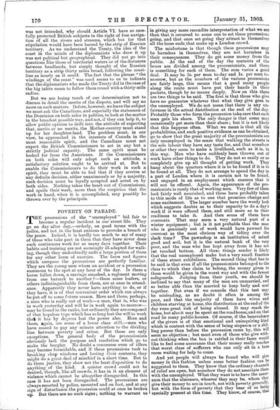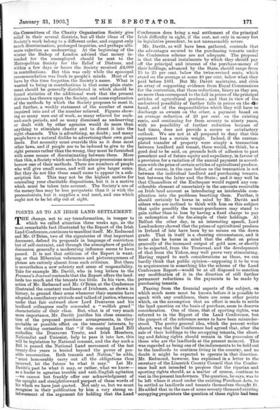POVERTY ON PARADE. T HE processions of the " unemployed "
bid fair to become a regular incident in our street life. They go on day after day,—orderly, on good terms with the police, and not in the least anxious to provoke a breach of the peace. Indeed, it is hardly too much to say of many of those who take part in them that they have never done such continuous work for so many days together. Their habits and training are not seemingly ill-adapted for walk- ing, though they undoubtedly unfit a large portion of them for any other form of exercise. The faces and figures which compose the processions are perfectly familiar. They are the young men whom an accident or a procession summons to the spot at any hour of the day. Is there a horse fallen down, a carriage smashed, a regiment moving from one barrack to another ?—these same loafers, or others indistinguishable from them, are at once in attend- ance. Apparently they never have anything to do, or if they have, it is of that convenient order which can always be put off to some future season. Here and there, perhaps, a man who is really out of work—a man, that is, who was in work yesterday and will be in work again to-morrow- may be found in the ranks, but ordinarily they are composed of that hopeless type which has so long lost the will to work that it has by degrees lost the power also. Here and there, again, are some of a lower class still,—men who have ceased to pay any minute attention to the dividing line between poverty and crime. But these are only exceptions. The general body of the processionists obviously lack the purpose and resolution which go to make the burglar. No doubt a concourse even of idlers may become formidable, and if these processions took to breakinab shop windows and looting their contents, they might do a great deal of mischief in a short time. But to do them justice, they show not the least disposition to do anything of the kind. A quieter crowd could not be desired, though, like all crowds, it has in it an element of violence which cannot be altogether disregarded. In this case it has not been disregarded. The processions are always escorted by police, mounted and on foot, and at any sign of disturbance the procession could at once be broken up. But there are no such signs ; nothing to warrant us in giving any more recondite interpretation of what we sea than that it occurred to some one to set these processions going, and that once set going they attract to themselves all the loose ends,that make up a London crowd.
The misfortune is that though these processions may be harmless in themselves, they are not harmless in their consequences. They do get some money from the public. At the end of the day the contents of the boxes are divided among the processionists, and there is something for each of them. The sum varies a good deal. It may be 38. per man to-day and is. per man to- morrow, but as the numbers of the various processions are fairly large, this means that a good many people along the route must have put their hands in their pockets, though by no means deeply. Now on this there are two things to be said. The first is that those who give have no guarantee whatever that what they give goes to the unemployed. We do not mean that there is any un- fairness in the actual distribution at the end of the day. Probably those who form the procession take care that each man gets his share. The only danger is that some may occasionally get more than their share ; but it is not likely that this happens often. What we mean is that all the probabilities, and such positive evidence as can be obtained, go to show that the great majority of the processionists are only unemployed in the sense that walking the streets is the sole labour they have any taste for, and that somehow or other they seem to make a livelihood, such as it is, in this way. Men who have suddenly been thrown out of work have other things to do. They do not so easily or so completely give up all thought of getting work. They hang about the quarters where it is to be found if it is to be found at all. They do not arrange to spend the day in a part of London where it is certain not to be found, and engaged in an employment which ensures that it will not be offered. Again, the appearance of the pro. cessionists is rarely that of working men. Very few of them look fairly well nourished, and these have probably taken to this mode of life as to one that promises change and some excitement. The larger number have the weedy look which suggests doubts as to their capacity to do a day's work if it were offered them, and still more as to their readiness to take it. And then some of them have overcoats. That may seem a very natural part of winter equipment ; but is it not probable that the man who is genuinely out of work would have pawned his overcoat as the most obvious way of tiding over the slack time ? The pawnshop is an institution of mixed good and evil, but it is the natural bank of the very poor, and the man who has kept away from it has not yet touched bottom. AU these things render it likely that the real unemployed make but a very small fraction of these street exhibitions. The second thing that has to be said is that even if all the processionists belonged to the class to which they claim to belong, the money given to them would be given in the worst way and with the fewest safeguards. Judging from their youth, we should be inclined to say that many of the men are unmarried, and so better able than the married to keep body and soul together. But even if we concede that this test may be misleading, as no doubt it often is among the poor, and that the majority of them have wives and children starving at home, the distribution at the end of the day runs great risk of being abused. It may reach the home, but also it may be spent on the roadhome, and on that road lie many ipublic-houses. Of course, if the benevolence of the givers s of that emotional and uninquiring kind which is content with the sense of being sixpence or a shil- ling poorer than before the procession came by, this will seem no objection ; but most even of those who give with- out thinking when the box is rattled in their faces would like to feel some assurance that their money really reaches that worst class of sufferers who can only it in a bare room waiting for help to come.
And yet people will always be found who will give money in this fashion unless some better fashion can be suggested to them. They know that the ordinary channels of relief are open, but somehow they do not associata them with the unemployed. What they want is to have the assur- ance that the almoners, whoever they may be, whom they give their money to are in touch, not with poverty generally, but with the form of poverty that they hear of as being specially present at this time. They know, of course, that the Committees of the Charity Organisation Society give relief in their several districts, but all their ideas of the Society's work belong to a different order, and suggest only much discrimination, prolonged inquiries, and perhaps ulti- mate rejection as undeserving. At the beginning of the winter the Bishop of London advised that money in- tended for the unemployed should be sent to the Metropolitan Society for the Relief of Distress, and within a few days or hours the Society received £4,000 in contributions. But this was only while the episcopal recommendation was fresh in people's minds. Most of us have by this time forgotten the Society's name. What is wanted to bring in contributions is that some plain state- ment should be generally distributed in which should be found statistics of the additional work that the present distress has thrown upon the Society, and some explanation of the methods by which the Society proposes to meet it, and further, a weekly statement of the number of cases inquired into and of the number relieved. Figures show- ing so many men out of work, so many relieved for such- and-such periods, and so many dismissed as undeserving or dealt with by other agencies would do more than anything to stimulate charity and to direct it into the right channels. This is advertising, no doubt ; and many people have a natural dislike to advertising their own good deeds. But necessity must override this as it does most other laws, and if people are to be induced to give to the right persons rather than the wrong, they must be furnished with some means of discriminating between them. More than this, a Society which seeks to displace processions must borrow one of their methods. There are numbers of people who will give small sums, and will not give larger sums. But they do not like these small sums to appear in a sub- scription list. This may not be the highest motive for concealing your charitable dispositions, but it is a motive which must be taken into account. The Society's use of the money-box may be less peripatetic than it is with the processionists, but it supplies a real need, and one which ought not to be let slip out of sight.























































 Previous page
Previous page